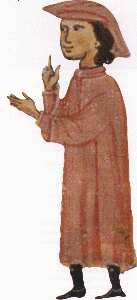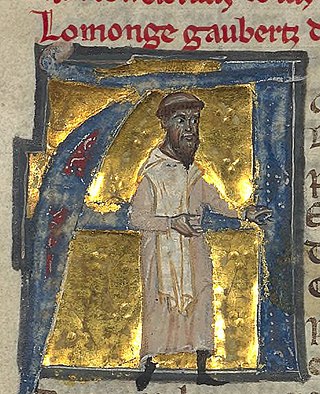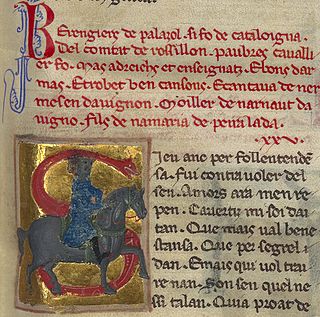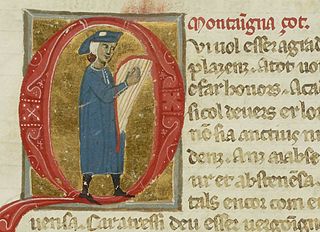
Aimeric or Aimery de Peguilhan, Peguillan, or Pégulhan was a troubadour born in Peguilhan, the son of a cloth merchant.
The Boecis is an anonymous fragment written around the year 1000 CE in the Limousin dialect of Old Occitan, currently spoken only in southern France. Of the possibly hundreds or thousands of original lines, only 257 are now known.
The canso or canson or canzo was a song style used by the troubadours. It was, by far, the most common genre used, especially by early troubadours, and only in the second half of the 13th century was its dominance challenged by a growing number of poets writing coblas esparsas.

Pons de Capduelh was a troubadour from the Auvergne, probably from Chapteuil. His songs were known for their great gaiety. He was a popular poet and 27 of his songs are preserved, some in as many as 15 manuscripts. Four of his cansos survive with musical notation.

Jausbert de Puycibot was a Limousin troubadour of the early thirteenth century. Fifteen of his works have survived, most of them conventional, but with a few that are expressive of "true feeling". According to some sources, Jausbert was a monk, lo Monge de Poicibot.

Daude, Deude, Daurde, or Daudé de Pradas was a troubadour from Prades-Salars in the Rouergue not far from Rodez. He lived to an old age and left behind seventeen to nineteen cansos, including twelve on courtly love, three about sexual conquest, one tenso, one planh, and a religious song. Only one melody of his entire oeuvre has survived.

Aimeric de Belenoi was a Gascon troubadour. At least fifteen of his songs survived. Seven others were attributed to him in some medieval manuscripts.

Berenguier de Palazol, Palol, or Palou was a Catalan troubadour from Palol in the County of Roussillon. Of his total output twelve cansos survive, and a relatively high proportion—eight—with melodies.
Bertran d'Alamanon, also spelled de Lamanon or d'Alamano, was a Provençal knight and troubadour, and an official, diplomat, and ambassador of the court of the Count of Provence. Twenty-two of his works survive, mainly provocative tensos and sirventes, many dealing with Crusading themes.
Folquet de Lunel was a troubadour from Lunel in the Languedoc. He left behind nine recorded lyric poems, including five cansos, two partimens, and two sirventes. He also wrote one longer work, the Romans de mondana vida. Folquet's birth date can be known precisely because he tells us in his Romans, written in 1284, that he was forty years old at the time.

Berenguer d'Anoia or de Noya was a Catalan troubadour from Majorca. He wrote the Mirall de trobar, an Occitan poetic, grammatical, and rhetorical treatise in the tradition of the Razos de trobar of Raimon Vidal and the Regles de trobar of Jofre de Foixà, a genre always popular in Catalan country.

Guilhem de Montanhagol was a Provençal troubadour, most likely active in Toulouse, but known in the courts of Provence, Toulouse, Castile, and Aragon. Guilhem left behind seven cansos and six sirventes. He also left behind one tenso with Sordello and his total surviving output comes to fourteen pieces.

Raimon de Cornet was a fourteenth-century Toulousain priest, friar, grammarian, poet, and troubadour. He was a prolific author of verse; more than forty of his poems survive, most in Occitan but two in Latin. He also wrote letters, a didactic poem, a grammar, and some treatises on computation. He was the "last of the troubadours" and represented l'esprit le plus brillant of the "Toulousain School". He appears in contemporary documents with the titles En and Frare.
Ffra Johan Basset was a Catalan author of twenty verses and a prose Letovari. His work is preserved in the Cançoner Vega-Aguiló (1420–30). He was probably active in the early years (1416–21) of the reign of Alfonso V. His religious title, fra ("brother"), has led to speculation that he was a knight of the Order of Saint John of Jerusalem. Basset preached at Cervera during Lent in 1424. It is recorded that he was a member of the "Order of Santa Anna". This is probably a reference to the convent of Santa Anna at Barcelona, which was originally a house of the Order of the Holy Sepulchre under the guidance of the Patriarch of Jerusalem. Cohabitating at Santa Anna was a group of Brothers of Penitence and some Augustinian canons of Santa Eulàlia del Camp. In 1420 the friars and canons passed into the Casa del Sant Sepulcre de Santa Anna.
Hollywood Girls : Une nouvelle vie en Californie, or simply Hollywood Girls, is a French soap opera created by Alexandre dos Santos, Jérémy Michalak, and Thibaut Vales for NRJ12. The series features an ensemble cast and follows a groups of French peoples who decided to start a new life in California, but their life is quickly disrupted by the diabolical Geny G and her husband, the Dr. David Moretti.

Peire Milo, Milon or Millon was a mid-13th-century Italian troubadour. His cobla esparsa "En amor trop pietat gran", he derives the word amor (love) from suffering and death (mor). His only other songs are cansos: